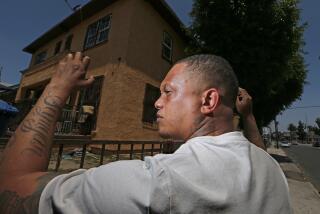Russian Officers Are Acquitted in Civilians’ Deaths
MOSCOW — Four Russian commando officers were acquitted Thursday in the shooting deaths of six Chechen civilians, after admitting in court that they mistakenly opened fire on their vehicle, then shot the survivors and set the car on fire to conceal the incident.
A civilian jury in southern Russia apparently accepted the officers’ defense that they were following the orders of their superiors. Some jurors joined family members in applauding as Capt. Eduard Ulman, 30, the special forces commander on the scene, was released.
The verdict concluded only the second major prosecution filed in what human rights groups say are years of abuses committed in Russia’s long-running conflict in the breakaway republic of Chechnya. The acquittal was denounced even by the republic’s pro-Kremlin president, Akhmad Kadyrov.
“Today’s verdict has made it difficult to convince the people of Chechnya that the country has a just judicial system that is guided by law,” Kadyrov told Interfax. “In spite of the clear gravity of the crime, which shocked the entire republic, the killers have been acquitted and released.”
In another courtroom Thursday, a judge sentenced a Chechen rebel to life in prison for an attack on a Russian military helicopter that killed 127 soldiers on board. The court found that Doku Dzhantemirov, 27, had transported the portable antiaircraft rocket used in the August 2002 strike in Chechnya and also filmed the attack. Four other suspects are at large.
In the civilian shooting case, prosecutors said there were “legal contradictions” in the verdict that could provide the basis for an appeal.
“Of course, there was a crime,” Ulman’s lawyer, Roman Krzhechkovsky, said in an interview. “I think this case will be reinvestigated, and those who gave the order should be found and tried.” Ulman, he said, “just executed an order. That is all.”
According to interviews with witnesses, family members and lawyers, the captain’s elite Spe- tsnaz unit was checking out reports that a notorious rebel commander was near the village of Dai when a jeep carrying five men and a woman failed to follow its order to stop.
The soldiers opened fire, killing the driver and wounding two passengers. Inside the vehicle the troops found two village school administrators, who were coming home from a conference; a farmer, a forester and a 41-year-old mother of seven. The sixth passenger, 22-year-old Magomed Musayev, though injured, had fled into the woods. He was found dead later about half a mile away.
When the soldiers found no guns in the jeep, they administered first aid to the victims, and Ulman eventually was able to reach his superiors on the radio.
“We have one 200” -- the military code for dead -- “and two injured,” he told Maj. Alexei Perelevsky, a co-defendant, according to lawyers who attended the trial.
“You don’t have one 200, you have all of them 200. Think it over, Ulman,” Perelevsky replied.
The soldiers shot the survivors, returned the bodies to the vehicle, poured gasoline on it and set it on fire to make it look like a roadside mine had blown it up, according to testimony.
Vakha Labazanov, a 46-year-old farmer, told The Times last year that he and two friends were also stopped at the scene, and saw the empty car beside the road, with its doors open and one side covered with blood. Its former occupants were not yet dead, he said.
“Not far from the car, a woman was standing and a man was squatting near her. He was holding his side with one hand. He looked in pain. Apparently he was injured. A soldier was standing next to them, holding them at gunpoint,” he said. “They didn’t say anything to us. But with their eyes, I think they were pleading for help.”
As he was forced up against his own car, he saw the soldiers dragging the woman and man into a nearby gully. At that point, he said, an armored military vehicle drove up, and an officer inside asked what was going on. “They had some heated exchange of words. And in the end, the one with the gun behind our backs said, ‘You are doing your business, and we are doing our business.’ ”
Shortly after that, the armored vehicle left and Labazanov and his friends were allowed to go.
Maj. Vitaly Nevmerzhitsky, former military intelligence chief in the district, was in the armored vehicle. He said Ulman asked him to help contact his superior officer for a decision on what to do.
“I know that Ulman didn’t want to kill them,” he said in an interview Thursday. “I know that after Ulman’s men shot at the car
Nevmerzhitsky said Ulman and his co-defendants -- including Lt. Alexander Kalagansky, 26, and noncommissioned officer Vladimir Voyevodin, 24 -- were victims of the Russian military’s rules on discipline. “I would hate to have found myself in Ulman’s shoes. I know what agony he was in over what to do,” he said.
Perelevsky’s lawyer, Nataliya Belyayeva, said her client likewise was following orders from a superior, though it was his voice on the radio. “We proved that Perelevsky only passed on the order, and himself had nothing to do with it,” she said.
In an interview during the trial, Perelevsky said the soldiers are faced with constant terrorist attacks from insurgents who look like civilians. “So, it is clear what threat a moving vehicle posed,” he said.
Lawyers for the victims’ families were outraged at the acquittal, and were particularly critical of the fact that the 12-member jury, sitting in the city of Rostov-on-Don, more than 300 miles from Chechnya, included no Chechens.
“If the victims were not Chechens, the verdict would be different today,” said Lyudmila Tikhomirova, a lawyer for the victims’ families.
Times staff writer Sergei L. Loiko in Moscow and special correspondents Alexei V. Kuznetsov in Rostov-on-Don and Mayerbek Nunayev in Chechnya contributed to this report.
More to Read
Sign up for Essential California
The most important California stories and recommendations in your inbox every morning.
You may occasionally receive promotional content from the Los Angeles Times.










